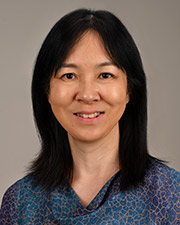Education
- Postdoctoral Fellow
- McGovern Medical School at The University of Texas Health Science Center at Houston (UTHealth), 2010
- PhD
- School of Life Sciences, Sun Yat-Sen University, Guangzhou, China, 2001
Areas of Interest
Research Interests
EPAC-Mediated Cell Signaling and Physiological Functions in Human Diseases
Exchange proteins directly activated by cAMP (EPAC) are major intracellular sensors for cAMP, a pleotropic second messenger and major stress response signal, independent of the classic cAMP receptor, protein kinase A (PKA). In mammals, there are two EPAC isoforms, EPAC1 and EPAC2, encoded by two separated genes. These novel cAMP sensors not only play critical roles at the crossroads of different physiological processes but also may represent attractive therapeutic targets for the treatment of various human diseases such as cancer, diabetes, chronic pain, infections, cardiac stresses and heart failure. A major focus of my research is exploring the molecular mechanism of EPAC and their roles in human diseases especially vascular remodeling related to disease conditions.
Using genetic and pharmacological approaches, we have demonstrated that EPAC1 signaling is involved in the development of multiple pathological conditions. EPAC1 deletion ameliorated pathological angiogenesis in mouse models of oxygen-induced retinopathy (OIR) and suppressed neovascularization during stenosis in carotid artery ligation in mice. Mechanistically, using human endothelial cell model we found that EPAC1 contributes to pathological neovascularization by modulating Notch and VEGF signaling, two key pathways for angiogenesis regulation. We further demonstrated EPAC1 regulates Notch signaling by regulating γ-secretase intracellular trafficking and inhibits its cellular activity. Next step, I will focus on how EPAC1 regulate Notch pathway in vascular smooth muscle cells, especially explore the cross- talk between EPAC1 and other signaling pathway in disease relevant stress condition. Taken together, using our current molecular tools and various models to dissect the function of EPAC1 in the development of proliferative vascular disorders will help understanding and development of more effective therapeutic strategies.
Publications
- Hua Liu, Fang C Mei, Wenli Yang (co-first author), Hui Wang, Eitan Wong, Jingjing Cai, Emma Toth, Pei Luo, Yue-Ming Li, Wenbo Zhang and Xiaodong Cheng. (2020). Epac1 Inhibition Ameliorates Pathological Angiogenesis Through Coordinated Activation of Notch And Suppression of VEGF Signaling. Science Advances., 6 (1): 1-13.
- Yang W, Mei FC, Cheng X. (2018). EPAC1 regulates endothelial annexin A2 cell surface translocation and plasminogen activation. FASEB J., 32(4):2212-2222.
- Wu W, Zhang J, Yang W, Hu B, Fallon MB. (2016). The role of splenic reservoir monocytes in pulmonary vascular monocyte accumulation in experimental hepatopulmonary syndrome. J Gastroenterol Hepatol., 31(11):1888-1894.
- Yang W, Hu B, Wu W, Batra S, Blackburn MR, Alcorn JL, Fallon MB, Zhang J. (2014). Alveolar Type II Epithelial Cell Dysfunction in Rat Experimental Hepatopulmonary Syndrome (HPS). PLoS One., 9(11): e113451.
- Yang W, Zhang J, Hu B, Wu W, Venter J, Alpini G, and Fallon M B. (2014). The role of receptor tyrosine kinase activation in cholangiocytes and pulmonary vascular endothelium in experimental hepatopulmonary syndrome. Am J Physiol Gastrointest Liver Physiol., 306 (1): G72–G80.
- Zhang J, Yang W, Hu B, Wu W, Fallon MB. (2014). Endothelin-1 activation of the endothelin B receptor modulates pulmonary endothelial CX3CL1 and contributes to pulmonary angiogenesis in experimental hepatopulmonary syndrome. The Am J Pathology., 184 (6): 1706-1714.
- Gao X, Cao Y, Yang W, Duan C, Aronson JF, Rastellini C, Chao C, Hellmich MR, Ko TC. (2013). BMP2 Inhibits TGF-β-Induced Pancreatic Stellate Cell Activation and Extracellular Matrix Formation. Am J Physiol. Gastrointest Liver Physiol., 304(9):G804-13.
- Yanna Cao, Wenli Yang (co-first author), Mathew Tyler, Xuxia Gao, Chaojun Duan, Judith F. Aronson, Vsevolod Popov, Hitoshi Takahashi, Hiroshi Saito, B. Mark Evers, Celia Chao, Mark R. Hellmich, Tien C. Ko. (2013). Noggin Attenuates Cerulein-Induced Acute Pancreatitis and the Impaired Autophagy. Pancreas., 42(2): 301–307.
- Junlan Zhang, Wenli Yang, Bao Luo, Bingqian Hu and Michael B Fallon. (2012). The Role of CX3CL1/CX3CR1 in Pulmonary Angiogenesis and Intravascular Monocyte Accumulation in Rat Experimental Hepatopulmonary Syndrome. J HEPATOL., 57:752-758.
- Duan C, Deng X, Cao Y, Chen Z, Yang W, Liu X, Wang W, Pati S, Kozar RA, Gonzalez EA, Holcomb JB, Ko TC. (2011). Increased TGF-beta Contributes to Deterioration of Fresh Frozen Plasma’s Effects on Endothelial Cells During Standard Storage. Shock., 36(1):54-59.
